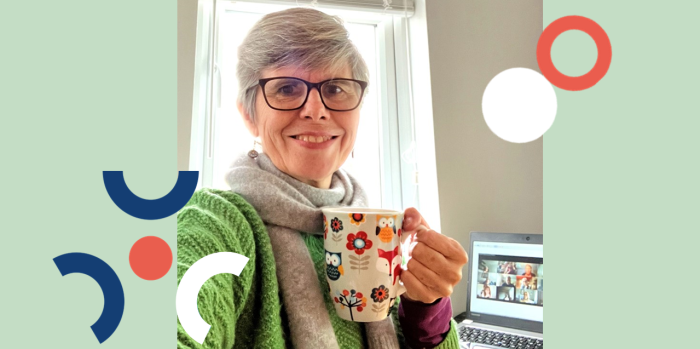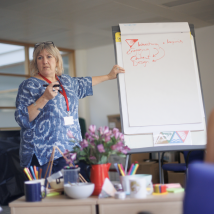Researchers and members of the public in our region have set up a community of practice and created a series of useful resources to help people explore ways to make health and social care research more inclusive.

Started in 2022 by our Inclusive Involvement in Research for Practice led Health and Social Care theme (IIRP), the community of practice supports researchers to consider different approaches to involve and engage people in their projects, so they can directly benefit communities. It brings together a diverse range of people and perspectives for discussions facilitated by IIRP theme co-lead Dr Elspeth Mathie.
Former Implementation leads John Gabby and Andree Le May worked with Elspeth and IIRP theme colleagues to plan and develop the community of practice to provide a constructive space to share knowledge, research methods and discuss the successes and challenges of public participation in research.
Five virtual sessions have all been recorded and summarised to share as learning resources for people working in health and social care research, to explore methods to improve accessibility, diversity and examine the ethics of involvement in research. To encourage further discussion, Elspeth has also opened a Padlet for people to post comments and suggestions online.
Elspeth said: “It’s really exciting how these sessions have evolved and taken off.
We have had some very honest discussions about how to make research more inclusive. We learn through sharing and discussing examples people have tried and being open about what works and what does not."
“There is great value in creating a group which includes members of the public, researchers and health and care organisations working together to learn. We hope the recorded sessions, resources and summaries are useful for others to develop their understanding and practice of inclusive involvement.”
Dr Elspeth Mathie, Co-Lead for Inclusive Involvement theme
Last month, our Public and Community Involvement, Engagement and Participation (PCIEP) Lead Dr Bryony Porter shared why community engagement is so important and the Inclusive Involvement community of practice demonstrates how to put this into action.
As a key part of our approach to apply the UK Standards for Public Involvement at the NIHR Applied Research Collaboration East of England (ARC EoE), the sessions have created inclusive opportunities, developed ways of working together, and encouraged communication between researchers and communities in our region.
Each workshop involves a small group of around 10 to 15 people meeting for over an hour, allowing plenty of time for informal discussions covering approaches including the World Café, walking interviews, street conversations, Universal Design in research, and co-production with Thurrock Lifestyle Solutions Community Interest Company.
Participants include members of the public, researchers, PhD students, Public and Patient Involvement (PPI) leads, representatives from Healthwatch and the NIHR Research Design Service. Different backgrounds and experiences are needed to discuss varying perspectives.
Amander Wellings is an ARC EoE public involvement contributor and previous member of the national INVOLVE Advisory Group and shared her feedback on the World Café approach:
“It’s good to have the opportunity to share research methods with others, to discuss the pros and cons from my perspective - a neurodivergent viewpoint. It’s important to think outside the box to make methods accessible to all.”
Amander Wellings, public contributor
Each session starts with one or two presenters sharing a public involvement approach or a way of making research more inclusive for around 10 minutes. This is followed by an informal discussion, short comments, key points and a summary to finish. The recorded presentations are published on the ARC EoE website accompanied by a short write up of the session.
Researchers at any stage of their career and students are welcome to join, as inclusive involvement should be an early consideration and focus for anyone planning a research project.
Amanda Farwell, PhD student at the University of Essex and ARC EoE said: “The community of practice meetings have advanced my knowledge of this method, and the individual components associated with using it. Hearing about personal experiences from Patient and Public Involvement members and researchers has provided me with alternative perspectives, which have highlighted the diverse considerations that are required from the planning stages, through to the feedback delivered at the conclusion of the sessions."
"Learning about the community of practice method has been extremely interesting and it is exciting to see how it really can create combined knowledge from everyone involved.”
Amanda Farwell, PhD student
Su Conquer from Healthwatch Suffolk said: “The community of practice sessions about inclusive research methods are brilliant. The mix of people who attend ensures a really interesting discussion each time, and everyone’s perspectives combined influence how people can think about the different topics."
"I have learnt a lot about more accessible and collaborative ways to collect and share information to improve research.”
Su Conquer, Healthwatch Suffolk
- The next session will be held in April and if you would like to suggest a topic for discussion or find out more, please contact E.J.Mathie@herts.ac.uk.
- Leave a comment, suggestion or recommendation for inclusive involvement on the community of practice Padlet.
